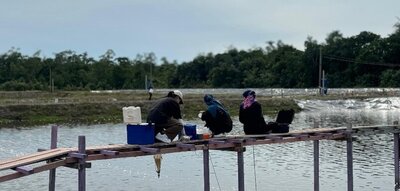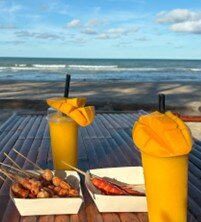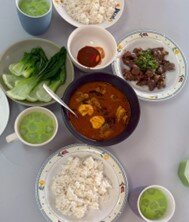OUR OQEANOUS STUDENTS
- HOME
- OUR OQEANOUS STUDENTS
- IJP
- IJP Report (UM Feb - Aug 2025)
International Joint Program
IJP Report (UM Feb - Aug 2025)
2025.09.30
Graduate School of Marine Science and Technology
Course of Marine Resources and Environmental Science
First Year of Master's Program
A.K.
I conducted an overseas placement at the University of Malaya's Bachok Marine Research Station in Kelantan, roughly 500 km from the main campus in Kuala Lumpur. I hope this report will be helpful to students considering to join the OQEANOUS Plus program.
【Motivation & Preparation】
In April 2024, my academic advisor introduced an opportunity to study under a professor at the University of Malaya. Although this would be my first long-term stay abroad--and in a rural area far from the capital--I decided to proceed, motivated by my long-standing goal of studying overseas. The roughly one-year lead time allowed me to handle visa applications and administrative procedures in an orderly manner.
【Main-Campus Orientation】
I arrived in late February 2025 and spent about two weeks in Kuala Lumpur for orientation, visa processing, and a medical exam. Activities such as a traditional dance workshop and a campus tour provided valuable connections with other international students.
【Bachok Research station & Coursework】
After securing my visa in Malaysia, I traveled by long-distance bus (approximately nine hours) to Bachok, in northeastern Malaysia. My primary role at the station was to assist a Ph.D. senior with ongoing research, during which I learned laboratory methods including the polymerase chain reaction (PCR). I joined field sampling trips two to three times per month, gaining hands-on experience with collection techniques and sample processing.
I also enrolled in two online courses: one core requirement for the master's program and another on environmental conservation policy. As the sole registered student, I benefited from in-depth, one-on-one discussions with the instructor. I am grateful to coordinators at both my home university and UM for facilitating this arrangement.
Figure 1. Sampling at a shrimp farm
【Daily Life】
In Kelantan, the weekend falls on Friday and Saturday. On weekdays I typically began work around 10:00, assisted with research, and completed class assignments, finishing around 17:00. Lunch varied among cooking, delivery, and dining out. On days off I focused on coursework, sketched as a hobby, or walked along the nearby beach. A weekend-only street stall area, about a 15-minute walk from the station, became a favored spot; enjoying fresh mango juice there with my senior was a particular highlight.
Water outages were relatively common in Kelantan, occasionally limiting use of the kitchen and washing machine. Adjusting to such infrastructure differences--along with connectivity and food availability--was an instructive part of living outside a major city.
Figure 2. Mango juice from a local stall Figure 3. A home-cooked lunch with lab members
【Culture & Reflections】
Kelantan's population is predominantly Muslim, and all students at the station were Muslim. I encountered culture and faith in everyday routines, including prayer times and dietary practices. Early in my stay, the month of Ramadan began; while it took time to adjust my schedule and norms, accordingly, observing these practices firsthand was deeply educational.
【Takeaways & Advice】
Experiencing life as a cultural outsider for the first time sharpened my awareness of differences in religion, customs, and daily habits. Initial uncertainty gave way to the realization that respectful curiosity and proactive communication are essential.
For prospective students -- especially those assigned to rural sites -- I recommend beginning preparations early and researching local living conditions in detail (e.g., water reliability, internet access, transportation, and food options). Such groundwork reduces anxiety and enables you to focus on your research from the outset.




